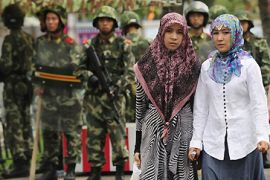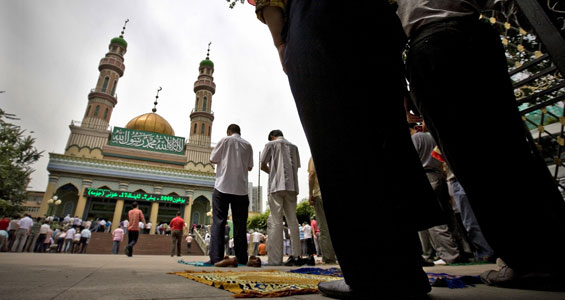Xinjiang unrest ‘not ethnic’
Chinese envoy tells Al Jazeera that “separatists” were to blame for riots.

 |
| Predominantly Muslim Uighurs accuse Beijing of political, cultural and religious repression [EPA] |
Violent unrest in China’s mainly Muslim western Xinjiang province in early July left at least 200 people dead as ethnic Uighurs clashed with Han Chinese and security forces.
China blamed separatists wanting the region to breakaway from China for the riots, while many Uighurs complained that political, cultural and religious repression by the Chinese government in Beijing led to the violence.
Predominantly Muslim Turkey, which shares linguistic and cultural links with the Uighurs, criticised Beijing over its response to what it called “a kind of genocide” and Iran spoke to Beijing about “concerns among Islamic countries”.
However, the response from much of the rest of the Muslim and Arab world was muted
Wu Sike, China’s special envoy to the Middle East, told Al Jazeera during a visit to Qatar that his country had always maintained good relations with the region and these would not be harmed by events in Xinjiang.
Al Jazeera: What happened in Xinjiang?
Wu Sike: Chinese relations with Arabs and Muslims date back to two or three millennia.
Therefore I hope our friends in the region would understand what happened in Xinjiang, where a minority of criminals tried to instigate violence against innocent civilians, in a bid to split the province from China.
Our Arab friends have always supported us in maintaining our country’s unity.
They supported us in the cases of Tibet and Taiwan, and China is grateful for that and hopes they would also understand what happened in Xinjiang and give us their support.
But the Chinese police have been accused of brutality in facing the Uighurs’ protests.
It was the government and security forces duty to stand up and defend the integrity of the country.
It was not meant against a certain ethnicity or religion at all. It was a legitimate government reaction to criminal acts.
So you deny that the reaction of Chinese security forces was ethnically and ideologically motivated?
There are 56 ethnicities in China, they believe in different religions and Islam is one of them.
The Chinese constitution secures the freedom of religion for every Chinese citizen. There are thousands of mosques in China.
As I said, the issue is about tiny minority of separatists trying to create chaos to achieve their goal.
However, there has been a government effort to change the ethnic make-up of Xinjiang. Millions of Han Chinese have settled in the province causing frustration among the province’s Uighurs.
China’s government did not do that.
How many Chinese people are there in the Arab Gulf? How many Arabs are there in China? That means people move around all the time.
Chinese people from somewhere in China moved to Xinjiang, what is the problem?
They are after economic opportunities, but the government did not try to change the demography of Xinjiang.
Moving to the Middle East, what are your thoughts on resolving the Arab-Israeli conflict?
China has always supported the Palestinians’ rights; however, after the 1991 Oslo talks between the Palestinians and Israelis, China accepted dialogue as means to solve the Palestinian issue.
In 1992 we established ties with Israelis and ever since we have supported the two state solution, where Palestinians would enjoy an independent sovereign state.
China’s position is the same when it comes to other occupied Arab lands, we support the liberation of occupied Arab lands.
Do you consider Hamas to be a terrorist organisation?
No, we encourage dialogue between Fatah and Hamas to resolve the issues between them and move toward a Palestinian state.
Is China interested in bigger role in the Middle East? Are you competing with the US?
China is not interested in competing with anyone; in the meantime we enjoy deep-rooted relationship with this part of the world.
Are you trying to sell arms to Arab countries?
No, the atmosphere is inappropriate to promote arms while everybody is relying on peaceful dialogue to resolve conflicts.
Today’s China is definitely different than China of the second half of the 20th century. Many are confused about your country’s identity, is it communist or capitalist?
As you may know, China has a population of over 1.3 billion, we had to invent something to accommodate this huge number of people.
You can say we have created our own model of socialism where we can keep our principles and generate income for our people.